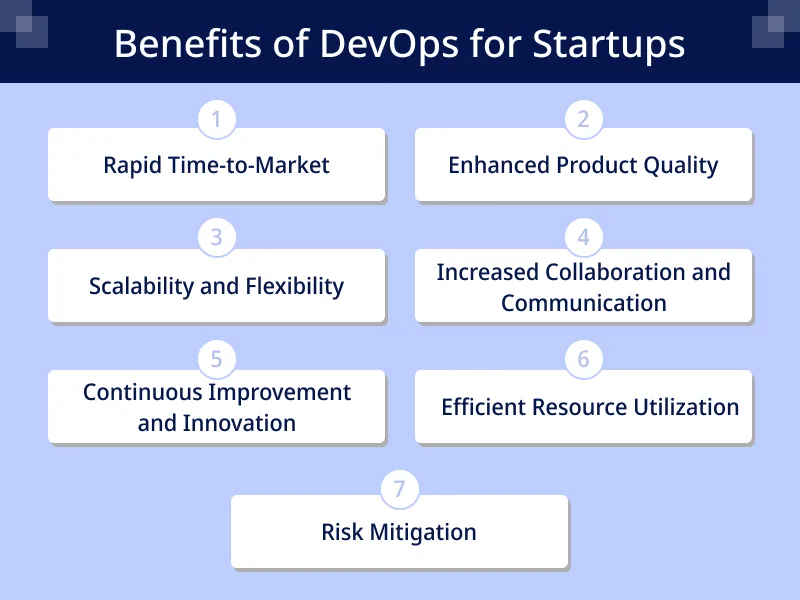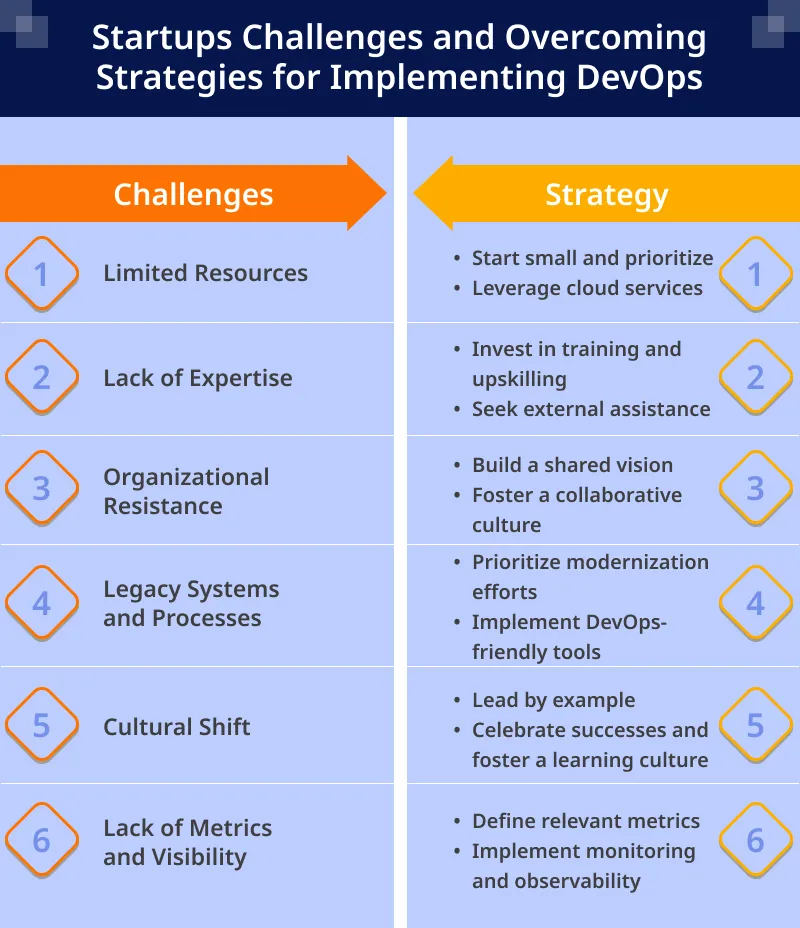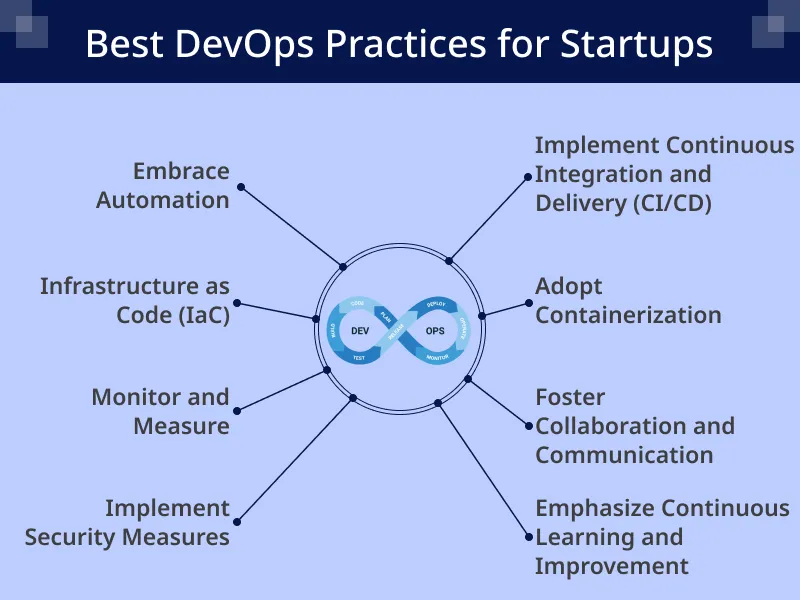Imagine transforming your startup into an agile powerhouse, where teams collaborate seamlessly, ideas turn into reality, and your product takes the market by storm. With DevOps at the core of your operations, this dream becomes a reality.
At ValueCoders, a leading provider of DevOps professional services and transformative IT solutions, we understand the challenges startups face on their path to success. That’s why we’ve crafted this captivating blog to empower you with the knowledge and strategies to streamline your development process.
This blog will get into the details of DevOps for startups. We’ll explore the best practices and real-life examples that can supercharge your growth journey. Get ready to witness firsthand how DevOps, combined with cutting-edge technologies, can unleash the full potential of your startup.
So, are you ready to propel your startup to new heights? Join us on an exciting expedition as we delve into DevOps for startups. Let’s unlock your growth potential together and pave the way for a future where innovation and success know no bounds.
The Benefits of DevOps for Startups
Are you a startup eager to disrupt the market and achieve rapid growth? In today’s fiercely competitive landscape, embracing innovative approaches is essential to stay ahead. That’s where DevOps steps in, revolutionizing the way startups develop, deploy, and scale their products with incredible speed and precision.
DevOps for startups has benefits that go beyond just accelerating growth. Here are some key benefits of DevOps specifically tailored to startups:
- Rapid Time-to-Market: In the startup world, speed is everything. DevOps enables startups to reduce time-to-market by automating manual tasks, streamlining processes, and ensuring faster and more frequent releases. By embracing Continuous Integration and Continuous Delivery (CI/CD) pipelines, startups can quickly iterate, test, and deploy their products.
- Enhanced Product Quality: Quality is paramount for startups looking to establish a strong brand presence and win customer loyalty. DevOps professional services emphasize automated testing, ensuring codes are thoroughly tested throughout the development lifecycle. With rigorous testing, startups can identify and fix bugs early, resulting in higher product quality, increased customer satisfaction, and improved brand reputation.
- Scalability and Flexibility: Startups often experience rapid growth and must scale their infrastructure and processes accordingly. DevOps practices like Infrastructure as Code (IaC) allow startups to provision and manage their infrastructure programmatically, enabling seamless scalability and flexibility.
With IaC tools like Terraform and Ansible, startups can adapt their infrastructure to changing demands, handle increased user traffic, and ensure a smooth user experience. - Increased Collaboration and Communication: DevOps breaks down silos and promotes cross-functional collaboration among development, operations, and other teams. Collaborative tools like Slack and Jira facilitate seamless communication, ensuring everyone stays on the same page and works towards a common goal.
By fostering a shared responsibility and effective communication culture, DevOps for startups can align their teams, break down barriers, and improve efficiency. - Continuous Improvement and Innovation: DevOps for startups encourages a culture of continuous improvement, where startups constantly evaluate their processes, gather feedback, and make iterative enhancements.
By embracing Agile development principles, startups can experiment, learn from failures, and adapt quickly to market demands. This enables startups to stay ahead of the curve, deliver value, and identify growth opportunities. - Efficient Resource Utilization: Startups often operate with limited resources, and Azure DevOps consulting can help maximize their efficiency. Cloud services like AWS, Azure, or Google Cloud provide startups with cost-effective infrastructure solutions, enabling them to pay for resources only when needed and avoid upfront investments.
- Risk Mitigation: DevOps practices address risk management by incorporating security, monitoring, and automated rollback mechanisms. Startups can proactively monitor their applications, detect anomalies, and respond swiftly to potential security threats. Automated rollback processes ensure that startups can quickly revert to a stable version in case of a deployment failure, minimizing downtime and customer impact.
By embracing DevOps, startups unlock a world of possibilities. The benefits are crucial for startups to thrive in today’s competitive landscape. With the right DevOps service provider and practices in place, startups can achieve sustainable growth, build a strong foundation for their business, and pave the way for future success.
Get free consultation and let us know your project idea to turn it into an amazing digital product.
How DevOps help startups streamline the development process and improve product quality?
DevOps for startups offer a robust framework to streamline their development process and enhance product quality. Through automation and continuous integration and delivery (CI/CD) practices, startups can accelerate the development cycle, reducing manual errors and ensuring faster time-to-market. Development and operations are broken down into silos by DevOps, which fosters collaboration, communication, and shared responsibility.
Additionally, DevOps promotes a culture of continuous improvement, enabling startups to iterate on their products, gather customer feedback, and incorporate enhancements seamlessly. By embracing DevOps principles, startups can optimize their development process, deliver high-quality products, and gain a competitive edge in the market.
Startups Challenges and Overcoming Strategies for Implementing DevOps
Implementing DevOps for startups can present unique challenges, including limited resources, lack of expertise, and organizational resistance to change. However, with the right strategies and best practices, startups can overcome these hurdles and successfully embrace DevOps. Here are some common challenges startups face and strategies to overcome them:
Challenge:
-
Limited Resources
Startups typically have budget constraints, limited human resources, and minimal infrastructure. These resource limitations can make it challenging to invest in the necessary tools, training, and infrastructure required for successful DevOps implementation.
Strategy:
- Start small and prioritize: Identify the most critical areas where Azure DevOps consulting can have the most significant impact. Focus on incremental improvements and gradually expand DevOps practices across the organization.
- Leverage cloud services: Utilize cloud platforms like AWS, Azure, or Google Cloud to access scalable infrastructure without upfront costs. Cloud services provide flexibility, cost optimization, and automated management, freeing up resources for other DevOps initiatives.
Challenge:
-
Lack of Expertise
Startups may lack the in-house expertise and knowledge needed to implement DevOps practices effectively. Finding the right skills and experience or providing training to existing team members can be a challenge.
Strategy:
- Invest in training and upskilling: Identify team members with the potential to become DevOps champions and provide them with training and certifications. Encourage a culture of continuous learning to keep up with evolving DevOps practices.
- Seek external assistance: Consider partnering with external consultants or engaging with specialized DevOps service providers like ValueCoders to fill gaps in expertise and gain valuable guidance during the implementation process.
Challenge:
-
Organizational Resistance
Implementing DevOps requires a cultural shift and organizational buy-in. Resistance to change from key stakeholders or team members that are comfortable with existing processes and methodologies can hinder the adoption of DevOps practices.
Strategy:
- Build a shared vision: Communicate the benefits of DevOps for startups clearly to all stakeholders, emphasizing its positive impact on productivity, quality, and business outcomes. Involve key decision-makers early in the process and address their concerns to gain buy-in and support.
- Foster a collaborative culture: Encourage cross-functional collaboration, break down silos, and create opportunities for teams to work together. Promote transparency and open communication channels to overcome resistance and build trust.
Also Read: 25 Best DevOps Companies In India | 2023
Challenge:
-
Legacy Systems and Processes
Startups often have legacy systems and processes that may not align with DevOps principles. Modernizing or integrating these legacy components with DevOps professional services and new practices can be complex and time-consuming.
Strategy:
- Prioritize modernization efforts: Identify legacy systems or processes that are hindering DevOps adoption and prioritize their modernization. Gradually replace or refactor legacy components to align with the principles of DevOps for startups, leveraging strategies like the Strangler pattern.
- Implement DevOps-friendly tools: Introduce modern tools and technologies that integrate well with existing systems, promoting automation, scalability, and collaboration. Choose tools that are compatible with legacy systems or provide seamless migration options.
Challenge:
-
Cultural Shift
DevOps for startups is not just about implementing tools and processes; it also involves a cultural transformation. Shifting from a traditional, siloed mindset to a collaborative, cross-functional approach can be challenging and requires changes in work dynamics and team structure.
Strategy:
- Lead by example: Embrace DevOps principles and practices within leadership roles to demonstrate the benefits firsthand. Encourage cross-functional collaboration, knowledge sharing, and experimentation.
- Celebrate successes and foster a learning culture: Recognize and celebrate achievements along the DevOps journey. Encourage teams to share their learnings, both successes, and failures, to foster a culture of continuous improvement and innovation.
Also Read: Understanding the Difference Between DevOps and DevSecOps
Challenge:
-
Lack of Metrics and Visibility
Without proper metrics and monitoring systems, startups may struggle to measure the effectiveness of their DevOps professional services and practices. Lack of visibility into performance, reliability, and efficiency can hinder their ability to identify areas for improvement.
Strategy:
- Define relevant metrics: Establish key performance indicators (KPIs) aligned with the goals of DevOps implementation. Metrics such as deployment frequency, lead time, and mean time to recover can provide insights into the effectiveness of DevOps practices and help drive improvements.
- Implement monitoring and observability: Set up robust monitoring systems to gain visibility into applications’ performance, availability, and usage patterns. Utilize tools like Prometheus, Grafana, or ELK stack to collect and analyze metrics, enabling data-driven decision-making.
Get free consultation and let us know your project idea to turn it into an amazing digital product.
Best DevOps Practices for Startups
When it comes to DevOps practices, startups can benefit from adopting specific strategies that are tailored to their unique needs and constraints. Here are some of the best Azure DevOps consulting practices that startups can implement to optimize their development process and drive growth:
- Embrace Automation: Automation lies at the heart of DevOps. Startups should automate repetitive tasks like building, testing, and deploying code changes. By automating these processes, startups can save time, reduce errors, and increase efficiency, allowing teams to focus on more strategic and creative aspects of their work.
- Implementing Continuous Integration and Delivery (CI/CD): Continuous Integration and delivery are fundamental DevOps for startups practices that help them deliver software faster and with greater quality. CI ensures that code changes are frequently and automatically merged into a shared repository, enabling early bug detection and integration issues. CD automates the release pipeline, allowing for rapid and reliable deployments, minimizing downtime, and accelerating time-to-market.
- Infrastructure as Code (IaC): DevOps for startups can leverage Infrastructure as Code to manage and provision their infrastructure resources using code. IaC reduces manual errors, ensures consistency, and facilitates infrastructure and code change deployment. Tools like Terraform and Ansible enable teams to define and version their infrastructure, allowing for reproducible and scalable environments.
- Adopt Containerization: Containerization, using technologies like Docker, allows startups to package applications and their dependencies into lightweight, portable containers. Containers offer consistency across different environments and simplify the deployment process. They enable startups to quickly scale applications, improve resource utilization, and achieve greater flexibility in managing their infrastructure.
Also Read: How DevOps Fuels Innovation and Propels Growth for Enterprises
- Monitor and Measure: DevOps professional services implement robust monitoring and measurement practices for startups to gain visibility into their application’s performance, availability, and user experience. Monitoring helps identify bottlenecks, performance issues, and potential problems, enabling proactive responses and continuous improvement. Utilize tools like Prometheus, Grafana, or ELK stack to collect and analyze metrics.
- Foster Collaboration and Communication: DevOps emphasizes the breaking down of silos between development, operations, and other teams. DevOps for startups encourage cross-functional collaboration, promote knowledge sharing, and establish effective communication channels. Chat platforms, collaboration software and other related tools facilitate seamless communication, ensuring everyone involved in the development process remains informed and aligned.
- Implement Security Measures: Startups must prioritize security throughout the development lifecycle. DevOps practices, such as incorporating security into the development process (DevSecOps), performing automated security testing, and regularly updating dependencies and patches, help ensure their applications and data’s security and integrity.
- Emphasize Continuous Learning and Improvement: DevOps is a continuous journey of learning and improvement. Regular retrospectives, post-mortems, and knowledge-sharing sessions can help teams identify areas for improvement and refine their DevOps practices over time. DevOps for startups should foster a culture that encourages experimentation, embraces failure as an opportunity to learn, and promotes continuous learning and professional development.
Also Read: Why The Involvement Of DevOps In The Business Process Is Important?
Real-Life Examples of Successful DevOps Implementations in Startups
DevOps for startups is one of the leading trends in technology today, exemplified by these trailblazing companies.
Example #1 – Amazon
Amazon, an eCommerce company, experienced significant challenges in predicting and accommodating traffic demands on their dedicated servers. Approximately 40 percent of server capacity remained unused, resulting in wasted resources and financial expenditure, especially during peak periods like Christmas shopping, when traffic could triple.
Amazon strategically embraced Amazon Web Services (AWS) cloud infrastructure to address these challenges. This shift enabled their engineers to scale capacity based on demand dynamically, eliminating the need for over-provisioning. Consequently, it led to adopting a continuous deployment process, empowering developers to deploy their code to servers in a self-service manner whenever required.
The transition to AWS and implementing of DevOps professional services and practices revolutionized Amazon’s development process. Within a year, the average deployment time reduced to a remarkable 11.7 seconds, showcasing the agility and speed of their operations. Furthermore, adopting DevOps principles resulted in a substantial reduction in both the number and duration of system outages, leading to improved customer experience and increased revenue for the company.
Amazon’s successful implementation of DevOps practices exemplifies how adopting cloud infrastructure and a continuous deployment process can drive efficiency, reduce costs, and enable rapid growth for startups and enterprises alike.
Also read: 30 Simple App Ideas for Startups (AI, ML, Blockchain, AR/VR)
Example #2 – Netflix
When Netflix transitioned from mailing DVDs to streaming videos online, it embarked on a groundbreaking journey into uncharted territory. Facing the challenge of managing a massive cloud infrastructure without available commercial tools, Netflix turned to the power of open-source solutions.
Taking a bold approach, Netflix harnessed the collective expertise of hundreds of volunteer developers to create the Simian Army. This suite of automated tools became their weapon of choice to stress test the infrastructure continuously. By proactively identifying and resolving susceptible before they could impact customers, Netflix ensured a seamless streaming experience.
Embracing a culture of automation and open source, Netflix elevated its DevOps practices to unprecedented heights. Their engineering teams embraced the philosophy of deploying code multiple times per day, leveraging automation to deliver updates and enhancements rapidly.
Netflix’s dedication to innovation and its successful integration of new technologies into its DevOps approach earned them the prestigious JAX Special Jury Award. This recognition is a testament to their relentless pursuit of excellence and ability to set new industry standards in IT.
As a result, Netflix continues to captivate audiences worldwide with its seamless streaming service, setting the benchmark for entertainment companies. Their commitment to DevOps, automation, and open source is a prime example of how organizations can leverage technology and collaborative practices to drive continuous improvement, agility, and customer satisfaction.
Netflix’s journey exemplifies DevOps’ transformative power in revolutionizing how technology is delivered and how it shapes entire industries. By embracing a similar mindset, startups can tap into the vast potential of DevOps for startups and forge their path to success in an ever-evolving digital landscape.
Get free consultation and let us know your project idea to turn it into an amazing digital product.
Implement DevOps to Accelerate Growth with ValueCoders
In conclusion, implementing DevOps practices can be a game-changer for startups looking to accelerate their growth. The benefits of DevOps are evident from real-world examples like Amazon and Netflix.
Startups face their own challenges when implementing DevOps. However, these challenges can be overcome with the right strategies and approaches. Startups can prioritize their initiatives, leverage cloud services, invest in training and upskilling, seek external assistance, and foster a collaborative culture to embrace DevOps successfully.
At ValueCoders, we understand the unique needs of startups and offer expertise in DevOps implementation. Our team of experienced professionals can offer advice, training, and support to help startups navigate their DevOps journey and unlock the full potential of their development process.
By partnering with ValueCoders, startups can tap into our extensive knowledge and experience in DevOps, leveraging industry best practices and cutting-edge technologies to accelerate growth, drive innovation, and deliver high-quality products to their customers.
Don’t let the challenges of limited resources or lack of expertise hold you back. Embrace DevOps with ValueCoders and unlock the power of streamlined development, enhanced collaboration, and accelerated growth. Contact us today to embark on your DevOps journey and propel your startup toward success.









